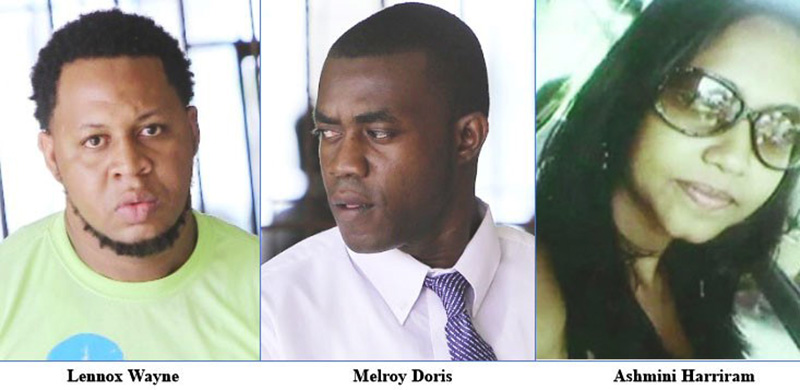After spending eight years on remand for murder and facing two previous trials which both ended in hung juries, Lennox Wayne, called ‘Two Colours,’ was visibly relieved yesterday after a jury in his third and final trial acquitted him.
Following hours of deliberations yesterday afternoon, the 12-member panel returned its unanimous verdict, finding Wayne not guilty of the 2014 fatal shooting of Lusignan beautician Ashmini Harriram.
The former accused was clearly elated when the forewoman announced the not-guilty verdict; but Justice Jo-Ann Barlow was quick to caution Wayne that he should see the opportunity “as a blessing” and not one to “big-up yuhself.”
Highlighting that much has “changed out here” over the years he had been incarcerated, the Judge also admonished the now freed Wayne to put to good use, whatever skill and training he would have acquired behind bars.
“It is my hope that you stay out of trouble,” Justice Barlow warned Wayne who nodded in agreement; even as she impressed upon his attorney Ronald Daniels to continue providing counsel that would keep the former accused in good stead.
The prosecution’s star witness, Melroy Doris, who had been charged along with Wayne and is currently serving a five-year sentence after pleading to a manslaughter charge in March of last year, had told the court that it was Wayne who had fatally shot Harriram.
The prosecution’s case was that Wayne had shot and killed Harriram, called ‘Monesha,’ at the Lusignan Railway Embankment, East Coast Demerara, on the morning of July 10, 2014.
Wayne, a former self-professed police informant, had, however, submitted the theory that the capital charge may have been levelled against him because he had previously testified in a matter against a senior member of the police force.
Wayne’s story was also that prior to being charged along with Melroy Doris for Harriram’s murder, he did not know who Doris was.
The star witness had told the court during the trial, however, that it was Wayne who had shot and killed Harriram.
According to Doris, who at the time was a taxi driver, Wayne had hired him to be transported to Lusignan.
He had said that as he drove along the Railway Embankment, Wayne requested that he stop the vehicle, and after he did, Wayne exited and shot the young woman after which he re-entered the car and ordered him to drive.
According to a caution statement, which police say Wayne gave to them, however, he alleged that Doris had approached him with the hit. Wayne, however, vehemently denied ever giving the statement to police.
The court had heard from the CS that Doris, with whom Wayne had become acquainted one month before the killing, told him of a “work” he wanted him, [Wayne] to get done.
The statement detailed Wayne as saying that after joining Doris’ car on the day in question, Doris retrieved a nickel-coloured handgun from beneath the seat and handed it to him.
After arriving at a location at Lusignan, the court had heard that Doris had pointed out one of two girls to Wayne, drove close to where they were and stopped the car and Wayne then exited and shot Harriram in the head, before grabbing her cellphone.
According to the statement, Wayne allegedly said they then fled the scene. He also reportedly said that Doris had promised to pay him $2.5 million for the job, but he never received any money.
The State’s case was presented by Prosecutor Lisa Cave.
In 2017, Wayne and his co-accused Doris had faced their first trial for the young woman’s murder, but the jury was hung, thus resulting in the need for a new trial.
Wayne’s second trial was conducted in June of last year. Doris pleaded to the lesser charge of manslaughter three months before.
Back in May of last year, Wayne approached the High Court for bail while it considered his Fixed Date Application (FDA) for the capital charge against him to be stayed, arguing that his right to a fair and timely hearing had been violated.
He had argued that while his case had repeatedly been listed in successive assizes, following his first trial, the Director of Public Prosecutions (DPP) had failed to commence any new trial.
High Court judge Navindra Singh had ruled, however, that Wayne would not be granted a stay of the capital indictment, since his right to a fair hearing had not been breached as he sought to contend.
Citing a plethora of case law authorities and statutes at the time, the Judge had said that the 33-month period for a retrial was not unreasonable, especially when considering the fact that the DPP had averred that the State had been prepared to proceed with the trial in January, 2021.
The Judge also noted the constraints brought on by the Coronavirus pandemic, which had placed a temporary halt on jury trials, with multiple accused persons in one case.
From the factual matrix of the action, Justice Singh also cited Wayne’s indication on several occasions of his desire to plead guilty to the lesser offence of manslaughter and in fact actively engaging in discussions about such a plea with the DPP.
This, the Judge had said, effectively waived any period of delay prior to such indication.
On every occasion, after indicating his willingness to plead, Wayne had a change of heart.






